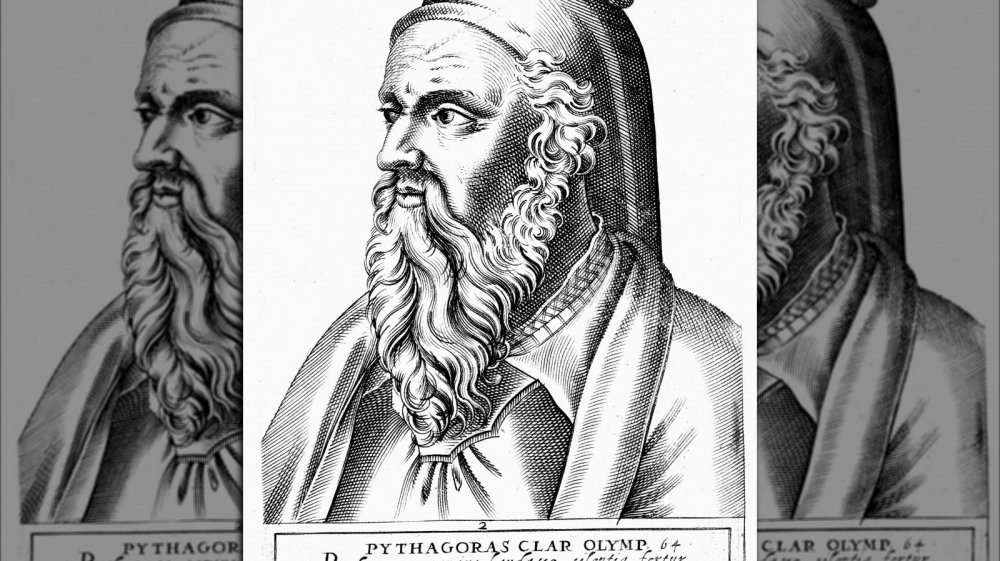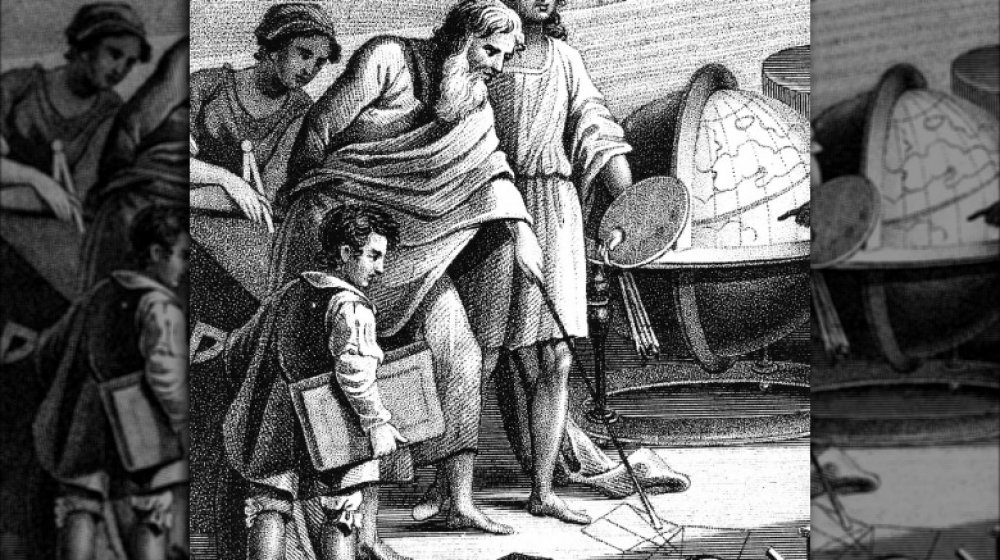The Reason Why Pythagoras Might Not Have Been Real
The majority of people who've never taken a philosophy class have a hard time naming — or caring about, for that matter — more than a handful of philosophers, but any middle school student could tell you who Pythagoras was. He was the guy with the triangles. All of the "a²+b²=c²" nonsense. Perhaps that's his main claim to fame, but Pythagoras is also known as the "father of harmony," for discovering a ratio that related music notes to one another, and as a philosopher, he delved into deep concepts like the afterlife and the soul. The guy seems like a total genius, right up there with people like Isaac Newton and Aristotle. There's just one problem with all of this: Pythagoras may not have discovered his infamous hypotenuse theorem after all. In fact, he may not have existed in the first place.
A new wave of philosophy historians are taking a more modern route when it comes to the great mathematician and stumper of middle school math students everywhere, including the possibility that he was more of an idea than an actual person. Why? For one thing, none of the philosopher's writings exist today. Everything mentioning Pythagoras comes from a second- or third-hand source. In his book The Cult of Pythagoras, Alberto A. Martínez further claims there's almost no evidence that Pythagoras, if he did exist, contributed anything to the fields of science and math.
The guy never actually wrote anything
He further claims that Pythagoras was used as a symbol to fill in forgotten pieces of history. This isn't the first time this has been seen in the Greco-Roman philosophical world either; several scholars suggest the situation is the same in regard to Socrates.
Stanford University argues that not only did Pythagoras write nothing, but none of his contemporaries wrote a single detailed account of the philosopher-scientist. Don't get us wrong — the guy became famous in his own time and his fame continued over the centuries, through the time of Plato and Aristotle into the present day. But everything we know about the famous Pythagoras came from a questionable source.
Instead of being an amazing math dude, Pythagoras was likely just a famous cult personality, that's if the cult didn't outright invent the Pythagoras persona. Which, is quite possible. In a move that you could only imagine happening if fangirls infiltrated the math club, the cult followers called themselves "Pythagoreans." The Pythagoreans are referenced in the writings of both Aristotle and Plato, but little is really known about them. We know they worshiped the cult figure Pythagoras as some sort of miracle worker or minor deity, as well as mathematical harmonies. According to Classical Wisdom, the Pythagoreans even sacrificed an ox to the Proposition of Euclid. Other beliefs, such as the immortal reincarnating soul that Pythagoras is said to have proposed, are central tenets to the Pythagorean faith.
Might have been invented by an Italian cult
They're also some of the earliest vegetarians. According to M.F. Burnyeat, a former senior research fellow in philosophy at Cambridge, the Pythagoreans most likely made all of the discoveries attributed to Pythagoras. The Pythagoreans definitely seem crazy enough to invent their own messiah, right? You know cults. They really like their otherwise unbelievable myths, and there's enough myth surrounding Pythagoras that it's difficult to say what about the philosopher was legend and what was real — assuming any of it was real.
As far as the Pythagoreans believed, according to Stanford University, their leader was outright mystical. He was a miracle worker and expert on religious ritual and the afterlife. He was a mystic who that could be in two different places at the same time, and his thigh was made of precious gold! Why thigh, and why gold? We don't know.
In an excerpt from Christian H. Bull's The Tradition of Hermes Trismegistus, posted at Brill, we learn that practitioners of Hermetic philosophy – what were formerly thought of as alchemists — have their own legends about Pythagoras. They say he's the son of Hermes and one of many incarnations of messiah known as "Hermes Trismegistus." That obscure religious bit has actually made it into fictional fandoms, such as the White Wolf role playing universe, as well. At this point, it's safe to assume that the person we know of as Pythagoras was mostly fiction.


